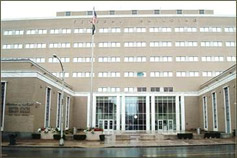Senior United States District Judge for the District of Connecticut
Staff Information

ABRAHAM RIBICOFF FEDERAL BUILDING
United States Courthouse
450 Main Street - Room 228
Hartford, Connecticut 06103
Location: North Courtroom
| Lisa Rickevicius | Judicial Assistant | 860-240-3659 |
| Jeffrey Higgins | Law Clerk | 860-240-3659 |
| Linda Ferguson | Courtroom Deputy | 860-240-3352 |
| Alicia Cayode Kyles | Court Reporter | 860-509-8743 / alicia_cayodekyles@ctd.uscourts.gov |

ABRAHAM RIBICOFF FEDERAL BUILDING
United States Courthouse
450 Main Street - Room 228
Hartford, Connecticut 06103
Location: North Courtroom
| Chamber's Telephone | 860-240-3659 |
| Clerk's Office Telephone | 860-240-3200 |
| Clerk's Office Fax | 860-240-3211 |